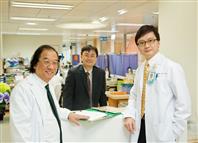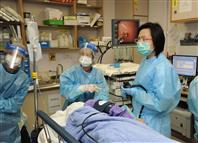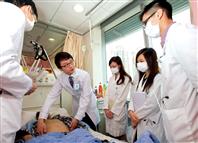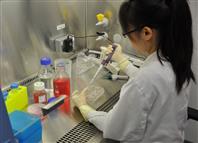Anatomy of an Academic Programme
The transmission of knowledge, the stimulation of thought, the promotion of research, and the creation of new knowledge are the core missions of universities as seats of higher learning. And, of all these mandates, the transmission of knowledge ranks as the most important, and the academic programme is its vehicle.
The term representing the degree, MB ChB, the abbreviation of Bachelor of Medicine and Bachelor of Surgery, comes from Latin, Medicinae Baccalaureus, Baccalaureus Chirurgiae. The Chinese University’s MB ChB Prgramme was launched in 1981, and it is well recognized internationally for its quality and innovative approach. The programme has nurtured generations of young doctors who serve the community through caring practice and strive to advance the overall standard of health.
Service Quality Comes First
Medical training is a long and rigorous process which begins with the selection of students. While attaining an ‘A’ is a must for admission to the programme, ‘it is not our primary criteria,’ said Prof. Francis K.L.Chan, associate dean (clinical), Faculty of Medicine. ‘We do not select those who regard being a doctor as just an occupation. What matters most is whether they are fully prepared. Doctors must not mind having to toil. They must be responsible and be willing to sacrifice.’ If they meet these requirements and some others, applicants may be admitted as medical students of CUHK.
Prof. Ng Ho-keung, associate dean (education), Faculty of Medicine, and chairman of the MB ChB Programme and Curriculum Committee, pointed out that medical students not only have two more years of study compared to other undergraduates, they also have to complete a one-year internship on top of that. They are given clinical exposure as early as Year 1 so they can get to know about the real work of a doctor. They have to sit for the professional examinations, in addition to the University’s. With this tremendous workload, it is crucial for their mental well-being that they have a positive attitude.
Clinical and Communication Skills
The medical curriculum can be divided into pre-clinical (Year 1 to 3) and clinical (Year 4 to 6). The first year is devoted to studies of the basic health sciences, and the second and third years to that of different bodily systems. Prof. Francis Chan stated that acquiring medical knowledge is the first step. Students should make effective use of what they learnt and devise the best treatment plans for patients accordingly. ‘Clinical training is vital in medical studies for giving medical students hands-on experience. However, in the traditional medical curriculum, students will not be given a chance to use their knowledge until the clinical stage, i.e., Year 3 or 4. In view of this, the Faculty revised this arrangement and incorporated clinical training in Year 1 courses when the curriculum was revamped 10 years ago. Through the process, students are well-trained on the skills of diagnosis and better prepared for long working hours and shift work during internship.’
Professor Ng said doctors not only have to deal with patients and the latter’s relatives, they also need to work with nurses, technicians and other professional staff. That’s why a course on communication skills has been added to the curriculum to enable students to communicate effectively.
Life-long Learning and Teaching by Example
As new diseases and viruses emerge, medical practitioners have to update their knowledge. Prof. Chan Sun-on Hector, assistant dean (education), Faculty of Medicine, said, ‘The Faculty reviews and revises its curriculum annually. The Faculty dean, associated deans and assistant deans meet with students regularly to gather their opinions and discuss aspects for fine-tuning.’ As Prof. Francis Chan said, ‘Knowledge is infinite. Yet the time for teaching is limited.’ The Faculty understands this and places emphases on nurturing students’ attitude and skills for life-long learning. It is only by pursuing life-long learning can doctors meet the challenges in a modern health care setting.
Medical theories can be learnt through studying, but professional ethics can only be effectively instilled through teaching by example. ‘Whenever I begin to teach autopsy, I’ll lead my students to observe a moment of silence as a mark of respect. After the class, students have to write a “thank you” card to the “silent teacher”. This is a tradition unique to the Chinese University. I believe that one has to respect life before one learns to save it,’ said Prof. Hector Chan.
Prof. Francis Chan agreed, ‘Medical education is characterized by the active interaction and close relationship of students and teachers. It’s similar to the apprentice system. As teachers’ behaviours are completely visible to students, teaching by setting examples is the most effective method.’
Once a Student, Now a Teacher
Having graduated from the CUHK MB ChB Programme in 1988, Prof. Francis Chan was deeply impressed by its idea of inspiring life with life. He returned to teach at his alma mater to pass on this tradition. He said, ‘The programme started from nothing. Not bounded by past traditions, the programme adopted an innovative perspective, e.g., nurturing caring doctors and transferring technological findings to application. So far we’ve produced over 3,400 medical graduates. The Hospital Authority has over 400 consultants and about 150 are CUHK graduates. That’s not an easy feat. I would even say it’s a miracle. I hope the programme could excel continuously, not only advancing medical education but also improving Hong Kong’s medical services.’
Strive for Progress
Being innovative, growing with the times, putting patients before anything else, and having passionate teachers, it is no surprise that the MB ChB Programme has enjoyed excellent assessment results in internal quality assurance exercises. Prof. Hector Chan stated that the implementation of the 3+3+4 academic reform has helped to obtain extra funding for installing new facilities. The renovation of the Choh-Ming Li Basic Medical Sciences Building will be completed soon. ‘Regarding the curriculum, the component on communication skills has also been further strengthened,’ said Professor Ng.
Prof. Francis Chan added that the Faculty is actively liaising with its alumni to consolidate their efforts to help develop the programme, and to demonstrate to society the contributions of its graduates over the past three decades. 





































































































































































Social Bookmarks